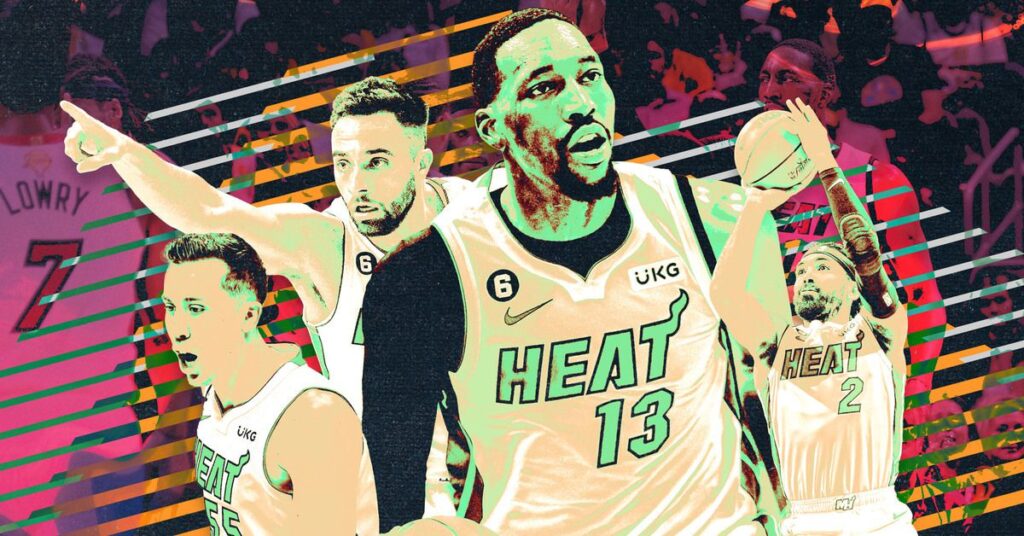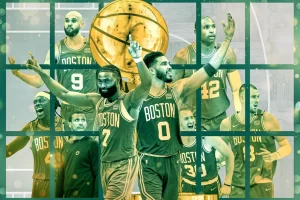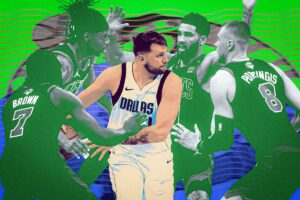Against All Odds, the Miami Heat Just Won’t Quit
After getting thoroughly outplayed in game one, the Miami Heat didn’t panic. They didn’t quit. Instead, they found a way to tie the Finals

I was tempted to do what everyone did after game 1: overreact. I read a million articles that raved about Denver and ragged on the Heat. Now, there was some truth in the post game one discourse. Denver looked comfortable in game one — like they were always one step ahead. That same image persisted when Denver built a 15-point lead in game two as Nikola Jokic watched from the bench. And yet, somehow, someway, these never say die, never quit Miami Heat found a way to win.
Not a whole lot was different from game one to game two. Jimmy Butler was still struggling. The bench unit was lukewarm for most of the game. And Nikola Jokic was the best player on the court. But, as they always seem to do, Erik Spoelstra and his group of warriors sent a message to Denver and the entire NBA world:
This series is far from over
How Miami “Slowed Down” Denver
Now, let’s get one thing straight. Denver’s offense was very effective in game two. While Miami ratcheted up the intensity and physicality, the Nuggets still cranked out a 125.6 offensive rating. That was a 13.8-point increase from game one. Still, Miami deserves a lot of credit for making things a little more difficult for Denver’s offense.
Miami’s defensive identity completely shifted in game two with the addition of Kevin Love to the starting lineup. Love hadn’t played in the last three playoff games, but was a vital addition for a few reasons. After Aaron Gordon bullied Miami’s smaller wings in game one, Miami knew they needed some more size. Love stuck on Gordon throughout this game and he was far less effective.
In 22 minutes, Love grabbed 10 boards and was a +18. When he was on the floor, Denver scored just 85 points per 100 possessions. That lineup change allowed Jimmy Butler to guard Jamal Murray. Denver is a very different team when Murray gets going, but Butler didn’t let him in game two.
Butler was physical and pushed Murray away from the basket. Other than his mini flurry in the fourth, Murray scored just 10 points through three quarters. Miami wouldn’t have won this game if Murray had played the way he did in game one. Butler’s defense was crucial to their success and will continue to be going forward.
A lot of Denver’s possessions felt disjointed. There wasn’t a lot of movement or passing. From the opening tip, the Heat executed their game plan to perfection. They forced 13 turnovers and made the Nuggets play on their heels more. A lot of that may have to do with Denver’s acclimation to the altitude, which was clearly effecting them in game one.
Now, let’s talk about Nikola Jokic. Coming into this series, Jokic was a nightmare matchup for Miami. The best solution I could offer to slow the guy down was to let him score and avoid letting him get all his teammates involved. In game one, Jokic shot the ball just twelve times but dished out 14 assists and totally controlled the game.
In game two, Jokic controlled the game differently. While he scored at will — finishing with 41 points on a season-high 28 shots — the Joker had a playoff-low four assists. According to Second Spectrum, his 11 potential assists were tied for his third-fewest in this postseason.
While he continually bullied Cody Zeller and Bam Adebayo on the block, none of his other teammates got into a rhythm. KCP and Michael Porter Jr. shot a combined 3/12 from the floor in game two. Those two guys also struggled defensively, which is perhaps a byproduct of not getting spoon-fed open looks. As Jokic famously said a few years ago, an assist makes two people happy. Without those assists, there isn’t as much happiness or lethality with this Denver offense.
It’s a step too far to suggest the Heat “let” Jokic score, though. Miami still fronted to deny him entry passes whenever they could. They switched coverages up. Erik Spoelstra scoffed at that notion after the game. “Yeah, that’s a ridiculous … that’s the untrained eye that says something like that. They have so many different actions that just get you compromised. We have to focus on what we do. We try to do things the hard way, and he requires you to do many things the hard way. He has our full respect.”
Still, in a series where Miami’s margins are next to none, they’d much rather see a game two Jokic performance than a game one performance. It’s a weird attitude to be happy when a guy drops 41 points, but such an outcome actually benefits the Heat.
The Heat’s ability to play so many different coverages and looks makes them a revolving Rubik’s cube. From their incredibly good zone defense to the addition to Love to the starting lineup, this team won’t give you an inch. As Denver adjusts in the upcoming games of this series, Miami will respond in turn, furthering their efforts to confuse and befuddle their opponents.
Miami’s Offense is Working Against Logic
Throughout this postseason, Miami’s offense has been hard to talk about. On the one hand, there’s beauty in the way Miami operates. At times, it can be the Jimmy Butler show. But when it’s not, the Heat play in a way that is similar to Denver. There’s lots of passing, cutting, and shooting that stretches teams out.
In game two, Miami forced a lot of missed rotations and miscommunications from the Nuggets because of their movement and spacing. Bam Adebayo spent more time on the perimeter, running dribble hand-offs and pick-and-rolls. With Denver in drop coverage for most of the night, those actions were very successful.
Still, game two was the perfect encapsulation of the weirdness of this offense. It succeeds despite going against common logic. In game two, Miami attempted just 12 shots in the restricted area — or about 15% of their total shot attempts. Even though they attempted 20 free throws, the Heat aren’t putting any pressure on the rim.
The counter to that is to not miss any shots from the perimeter, which is a strategy I think more teams should adopt. In game one, the Heat missed open looks, and their role players went ice cold. That didn’t happen in game two. After going 0/10 in the series opener, Max Strus made four triples in the opening quarter. Duncan Robinson scored ten points to open the fourth quarter and help Miami recapture the lead. Miami shot a scorching 17/35 (49%) from beyond the arc.
Adebayo was the hub for everything the Heat did offensively. He was more efficient and got to make a lot of decisions when Denver started to hedge those screens/handoffs. Even the passive Butler was effective in creating shots for others. Denver was so scared of switching screens with Butler involved that it generated open looks for others.
Of course, the Heat would love to see a more aggressive Butler as this series progresses. I’m still worried about this whole “only shoot jumpers” strategy. They’ll need reliable ways to score in the halfcourt, and Butler is about as reliable as it gets. Still, the multitude of angles that this offense comes at you is overwhelming.
I’ve failed to mention Gabe Vincent, who has been Miami’s most consistent role player in this series. He’s averaging 21.0 points per game in this series, second to only Adebayo. I’m sure the Nuggets weren’t losing sleep at night at the thought of Gabe Vincent giving them fits. But, he we are. Such is life when going against the Miami Heat.
This Series has been Very Weird
Through two games, there are so many juxtapositions that have been created. Denver hasn’t played to their best ability yet, but their “commanding” game one victory only saw them win by 11 points. And even though they struggled to shoot or gain a rhythm in game two, they were one Jamal Murray three away from overtime and a potential 2-0 series lead.
As the series shifts to Miami, expect more adjustments from these two tacticians. If you’re Denver, you may cut down on MPJ’s minutes if he continues to struggle offensively. Bruce Brown offers you more defense and versatility. There’s a reason he replaced MPJ down the stretch of game two.
After game two, it was equally fascinating and concerning about some of the quotes coming from the Nuggets. There were comments from players and coaches alike about the lack of energy. In case you forgot, these are the NBA Finals! Any doubts about energy or motivation should have been left in mid-January, not in the middle of the Finals!
I still like Denver’s chances in this series for a few reasons, however. Their bench unit was excellent in game two, getting out in transition and getting stops. Denver won the non-Jokic minutes by 14 points. If that happens again, I doubt the Nuggets are going to lose.
Another reason to be optimistic if you’re Denver has been the stark difference between Jokic and Butler. Again, it’s hard for me to see Miami winning this series if Butler continues to be this passive. I’m hoping the Nuggets will stop overreacting to every Butler PnR if he’s not even looking to shoot the ball.
But, even I must admit that the Miami Heat did something that no other team has done to Denver this postseason. Not only did they become the first team to win on the road at Denver, but they also made them uncomfortable. I didn’t think that was possible, given how dominant the Nuggets have been this postseason.
This is the first time the Nuggets haven’t enjoyed the luxury of a 2-0 series lead as the series shifts locations. This is only the second time this postseason they’ve truly faced any real adversity. Meanwhile, Miami is built on the backs of adversity. They benefit when everything goes against them, kind of like a cockroach.
As this series continues, one thing is for certain. This series has been the opposite of boring. Miami has squashed any doubts about this series being a formality. As they’ve done all postseason, the eighth-seeded Heat are playing spoiler. They’re never going to quit, and they just may have found a formula to become the unlikeliest champions ever.
Will the Miami Heat Pull Off the Unthinkable? Leave a Comment Down Below!
Follow My Instagram & Facebook To Never Miss a Post: @hoopnotions


